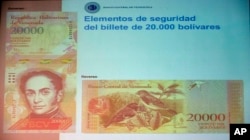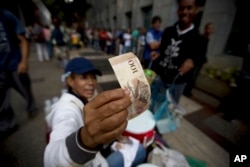The government of Venezuela says another airplane carrying new bolívar bills arrived in the country to ease its financial and currency crisis. But critics say the new bills won't help the shortages of basic goods that have made for a grim Christmas holiday in the South American country.
Mariela Magallanes, opposition lawmaker at the National Assembly, says the traditional Christmas and New Year celebrations have been marred by the lack of food, medicine and other goods.
“Hunger is the number one issue for Venezuelans right now, a problem that keeps on growing exponentially,” Magallanes said. “The lives of three million Venezuelans are at risk due to the lack of food, and shortages, and lack of access to proper nourishment. The shortages are forcing younger Venezuelans to leave the country in search of a better life elsewhere.”
Food shortages easing?
The government of President Nicolás Maduro says that shortages of food and basic products are now easing. However, long lines of Venezuelans trying to buy food are a common sight all over the country, Roland Parra told VOA.
“These lines are endless. Lines this long … when you see them you realize that food shortages are real. Things are not getting any better, in fact, they have definitely worsened,” said Parra.
José Khan, vice president of Central Bank of Venezuela, announced Wednesday that a new shipment of 710 boxes containing 500-bolívar bills has arrived to counter the economic crisis. The bills belong to the new set of currency that will govern all monetary transactions in Venezuela.
“We are complying with what President Maduro promised. A new shipment of 500-bolívar bills arrived today to complete 60 million 500-bolívar-bill units,” Khan said.
Violent demonstrations
Khan promised that more bills would arrive in the next few days, complying with what the government says is a plan that will get new cash to the public in record time.
Earlier in December, Maduro declared that 100-bolivar notes would be withdrawn from use within 72 hours. The measure, he said, was intended to boost the economy and fight black market trading. It would be replaced by notes that range in value from 500 to 20,000 bolivars.
But thousands of Venezuelans, angry at finding themselves suddenly without a way to pay for food, protested. In the face of, at times, violent demonstrations, the government delayed withdrawing the notes until January and promised to bring in new coins and bills quickly.
Staggering recession
The Venezuelan economy is suffering a staggering recession, partly because of weak oil prices. At the same time, the country is being hit with inflation that the International Monetary Fund estimates at more than 400 percent this year. And in recent months, the currency has fallen more than 50 percent in value.
Opposition leaders and economists say government controls on prices, imports and food distribution have led to growing shortages of consumer goods and when goods are available, people had to use wads of cash to pay for them.






